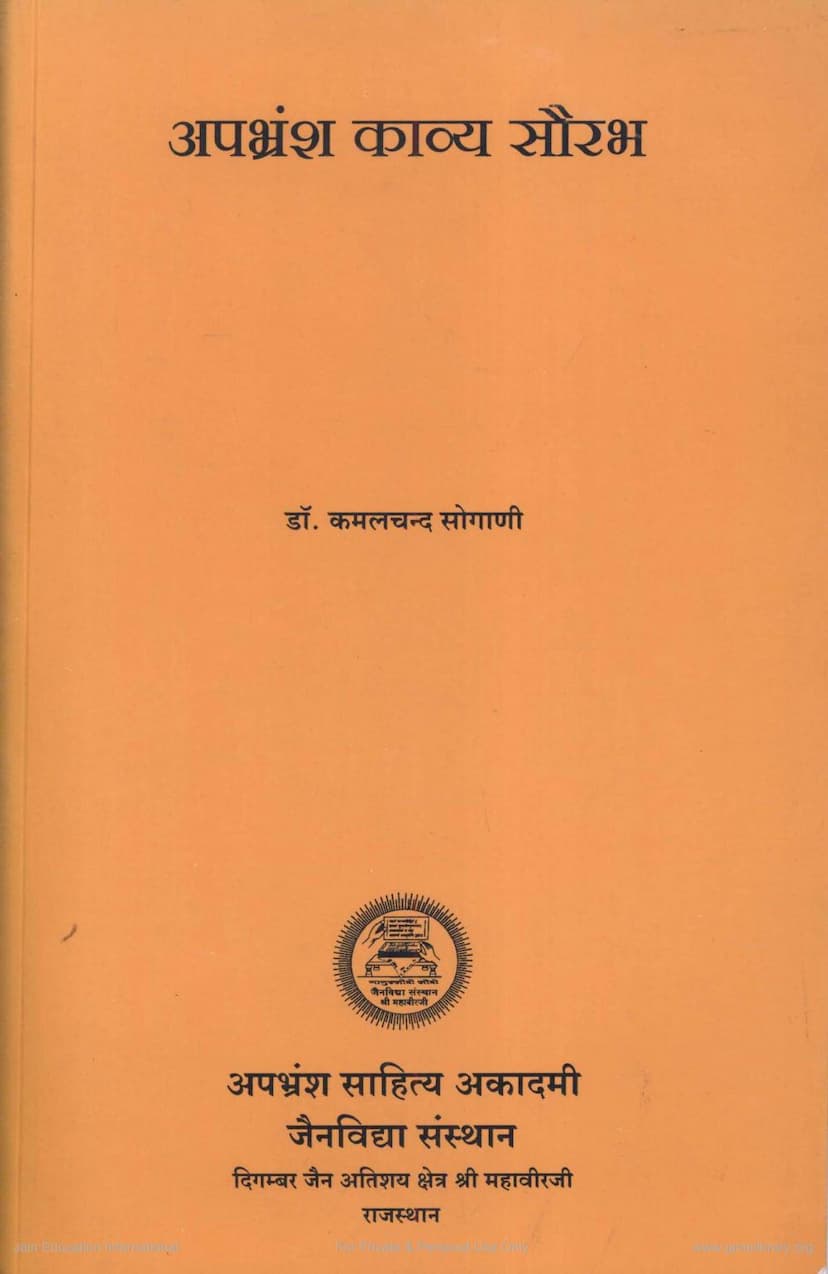Apbhramsa Kavya Saurabh
Added to library: September 1, 2025

Summary
Here's a comprehensive summary of the Jain text "Apabhramsa Kavya Saurabh" by Kamalchand Sogani, based on the provided pages:
Book Title: Apabhramsa Kavya Saurabh (A Treasury of Apabhramsa Poetry) Author: Dr. Kamalchand Sogani Publisher: Apabhramsa Sahitya Academy Edition: Second Edition, 2007
Overall Purpose and Content:
"Apabhramsa Kavya Saurabh" is a collection of selected verses (kavyanshas) from various important Apabhramsa literary works. The book aims to make these ancient Apabhramsa poems accessible to a wider audience, especially Hindi scholars and students. For each selected excerpt, the book provides:
- Apabhramsa Text: The original verses in the Apabhramsa language.
- Hindi Translation: A clear translation of the verses into Hindi.
- Grammatical Analysis: A detailed breakdown of the Apabhramsa words, including their grammatical function, root forms, and case endings where applicable.
- Word Meanings (Shabdarth): Explanations of individual words to aid understanding.
The book is structured into 17 "Lessons" (Path), each focusing on excerpts from different renowned Apabhramsa texts.
Key Apabhramsa Texts Included:
The collection draws from significant works of Apabhramsa literature, showcasing the richness and diversity of the language and its poetry. These include:
- Pumchariu (Padmacharita): Attributed to Mahakavi Svayambhu. Excerpts describe scenes from the life of Rama, including his coronation, the suffering of Sita, the aftermath of war, and familial interactions.
- Mahapurana: Attributed to Mahakavi Pushpadanta. Selections focus on themes of kingship, duty, renunciation, and the conflict between righteousness and power, particularly highlighting the stories of Bharata and Bahubali.
- Jambusamichariu: Authored by Mahakavi Vir. This work narrates the life of Jambu Swami, a Jain ascetic, focusing on his worldly experiences and eventual spiritual renunciation.
- Sudansanchariu: Written by Muni Nayanandi. The excerpts cover the consequences of indulging in the seven deadly sins (sapt vyasan), the importance of chastity (sheel), and the philosophical reflections on destiny and human actions.
- Karakandcharitu: Composed by Muni Kanakamar. This work details the life of Karakandu, including themes of royal duties, the separation of loved ones, and the pursuit of virtue.
- Dhanyakumaracharita: By Mahakavi Raidhu. The passages describe the life of Dhanyakumar, highlighting his journey from hardship to spiritual enlightenment, emphasizing the role of karma and good deeds.
- Hemachandra ke Dohe: Selections from the Doha verses of the great scholar Acharya Hemchandra, known for their moral and philosophical teachings on life, conduct, and destiny.
- Paramatmashravaka: Composed by Yogindu. These verses delve into Jain philosophy, describing the nature of the soul (Atma) as belonging to three states – external (Bahiratama), internal (Antaratma), and supreme (Paramatma) – and the path to liberation.
- Pahud Doha: Authored by Muni Ramsingh. These philosophical verses in the Doha meter explore themes of self-realization, the emptiness of worldly attachments, and the path to spiritual liberation.
- Savayadhammadoha: Attributed to Acharya Devsen. This work focuses on the religious duties and ethics of lay followers (Shravakas), presented in the Doha meter.
Author's Approach and Significance:
Dr. Kamalchand Sogani, a former Professor of Philosophy, has undertaken the meticulous task of selecting, translating, and analyzing these Apabhramsa poems. The book's preface highlights the importance of Apabhramsa as the mother of modern North Indian languages and its significant contribution to the development of Hindi literature. The second edition expresses gratitude for the positive reception of the first edition.
The grammatical analysis provided is particularly valuable, allowing readers to understand the nuances of Apabhramsa grammar and etymology. The inclusion of poet biographies (Kavi-Parichay) and context for the verses (Kavya-Prasang) further enriches the reader's understanding and appreciation of this classical literature.
Overall Contribution:
"Apabhramsa Kavya Saurabh" serves as an important resource for students and researchers of Apabhramsa literature and Jain religious texts. It bridges the gap between ancient Apabhramsa poetry and modern readers, offering a comprehensive insight into the linguistic, literary, and philosophical aspects of this rich tradition. The book is a testament to Dr. Sogani's dedication to preserving and promoting Apabhramsa literature.